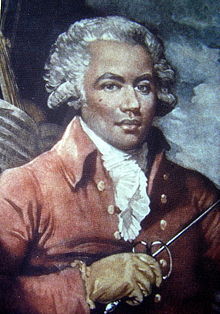Joseph Bologne, Chevalier de Saint-Georges
| Joseph Bologne, Chevalier de Saint-Georges | |
|---|---|

Saint-Georges by Mather Brown, 1787.
|
|
| Born |
December 25, 1745 Baillif, Basse-Terre, Guadeloupe |
| Died | June 10, 1799 (aged 53) Paris, France |
Joseph Bologne, Chevalier de Saint-Georges (December 25, 1745 – June 10, 1799) was a champion fencer, virtuoso violinist, and conductor of the leading symphony orchestra in Paris. Born in Guadeloupe, he was the son of George Bologne de Saint-Georges, a wealthy planter, and Nanon, his African slave. During the French Revolution, Saint-Georges was colonel of the Légion St.-Georges, the first all-black regiment in Europe, fighting on the side of the Republic. Today the Chevalier de Saint-Georges is best remembered as the first classical composer of African ancestry.
Born in Baillif, Basse-Terre, he was the son of George Bologne de Saint-Georges, a wealthy planter on the island of Guadeloupe, and Nanon, his African slave. His father, called "de Saint-Georges" after one of his plantations in Guadeloupe, was a commoner until 1757, when he acquired the title of Gentilhomme ordinaire de la chambre du roi (Gentleman of the king’s chamber). Misled by Roger de Beauvoir’s 1840 romantic novel Le Chevalier de Saint-Georges, most of his biographers confused Joseph’s father with Guillaume-Pierre de Boullogne, Controller of Finance, whose family was ennobled in the 15th century. This led to the erroneous spelling of Saint-Georges’ family name as "Boulogne", persisting to this day, even in the BnF, Bibliothèque nationale de France.
In 1753, his father took Joseph, aged seven, to France for his education. Two years later, on August 26, 1755, listed as passengers on the ship L’Aimable Rose, Bologne de Saint-Georges and Negresse Nanon landed in Bordeaux. In Paris, reunited with their son Joseph, they moved into a spacious apartment at 49 rue Saint André de Arts.
Joseph was 13 when he was enrolled in Académie royale polytechnique des armes et de ‘l’équitation (fencing and horsemanship). According to La Boëssière fils, son of the Master: “At 15 his [Saint-Georges’] progress was so rapid, that he was already beating the best swordsmen, and at 17 he developed the greatest speed imaginable.” He was still a student when he beat Alexandre Picard, a fencing-master in Rouen, who had been mocking him as "Boëssière's mulatto", in public. That match, bet on heavily by a public divided into partisans and opponents of slavery, was an important coup for the latter. His father, proud of his feat, rewarded Joseph with a handsome horse and buggy. In 1766 on graduating from the Academy, Joseph was made a Gendarme du roi (officer of the king’s bodyguard) and a chevalier. Henceforth Joseph Bologne, by adopting the suffix of his father, would be known as the "Chevalier de Saint-Georges".
...
Wikipedia
